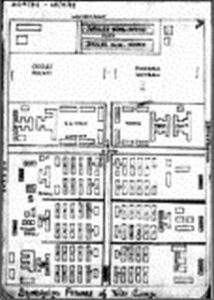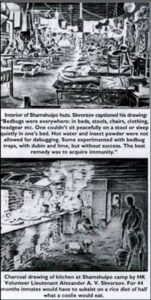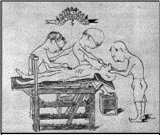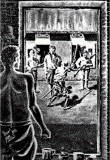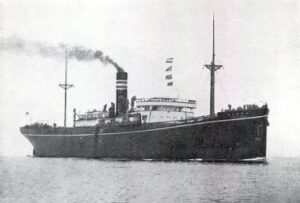Experiences at Shamshuipo & Sendai Camps
Shamshuipo Camp
We were put in Quonset huts with about 50 men in each hut. No. 6 Company personnel had their own hut, and No. 5 Company and Field Ambulance of the Hong Kong Volunteer Defence Force were next to us. In fact, the Volunteers were all in a row as we were under the command of the same sergeant major.
Besides the Volunteers, there were the Royal Scots and Middlesex Regiments, one Indian artillery regiment, one Chinese Field Ambulance Section, and the two Canadian Regiments – the Royal Rifles of Canada, and the Winnipeg Grenadiers. After the Chinese and Indians were later released, there was a rumour that we (the Portuguese) would also be released, but this never happened.
It was winter and very cold, and the windows and the doors of the huts had all been looted so we had to go scrounging (a polite word for stealing) for pieces of wood and corrugated metal sheets to fabricate our own with the help of the Royal Engineers.
POWs allowed to send only one letter a month
We were allowed to write one letter a month which was only sent out after being censored by the Japanese. What you could say: “Dear Mom, How are you? I’m well. Your loving son.”
Father Green tended to our spiritual needs, saying mass every morning in one of the huts. Leonel Silva was his aide. (Leonel’s father, Nado, was also in the camp). The Engineers built us a brick altar to give us quite a chapel. Father Green was badly beaten up by the Japanese one day, but I never found out why. [In his memoirs published here in Spring 1998 Luigi Ribeiro, who was also a POW, wrote:
“Fr. Green had reason to believe that the camp authorities had not spent all the money received from the Vatican. He had the brazen audacity of going to the Japanese to ask for an explanation in connection with the disbursement of the Vatican funds.
For his impudence, Fr. Green was given such a battering that he passed out completely and had to be revived by throwing water over his face.” – Ed.]
We had a hospital and a mortuary, both of which had no proper windows or doors, so when we walked by these places we could watch the doctors and staff going about their business.
We also had a chicken farm, a pig farm and a football field, a garden full of tomatoes, melons and lots of greens, but they were only for hospital patients so there was no chance of scrounging, as there were guards all over the place – Japanese, and our own men.
The pigs in the farm were huge, like cows, which the Engineers killed by hitting them over the head with a wooden mallet. We once sat on the side of the field and watched this pig chase the Engineers. More Engineers had to come out to help them.
POWs forced labour at Kai Tak, Aberdeen and Lai Chi-kok
We were put to work in Kai Tak Airflield, cleaning nullahs (large, open boxed culverts) and shovelling down a whole hill (quite a mountain) to enlarge the airport. A few soldiers died because of landslides, despite our futile efforts to dig them out.
We had a first-aid station under a tree and the sick could go there to rest and recuperate. On the first day, there were two or three of us. The next day, there were ten. Then everybody got into the act until the Japanese sentries chased us away with fixed bayonets. Then it was back to normal, with two or three genuine patients, for the others preferred not to get “sick”. Anyway, at Kai Tak, the grass was so long that you could go to sleep and the guards couldn’t see you.
We also had to shift bombs from one godown to the other stacking and unstacking the 500 and 1,000 pound bombs.
The other big job was at Aberdeen. We had to take oil and kerosene drums down to the pier and then later load them on to a barge to be taken to Lai Chi-kok Socony (Standard Oil Company of New York) Installation. There were so many drums that it took us six months to clear the godowns.
We got up at 5:00 a.m., had breakfast, and waited on the parade ground to be counted. Then we were put on a barge which took over an hour to reach Aberdeen. Most of us slept on the barge and others chatted and read books. The Japanese brought in a lot of books giving us quite a good library. (The books were looted from private libraries in the Colony – Ed.)
Allies bomb targets in Hong Kong
While we were working on the drums, an Allied spotter plane flew over us every morning. The air-raid siren went and the Japanese guards ran up the hills, far away from the drums. We sat on the drums, and as we had our own spies, we knew the same spotter plane came over every morning. The American bombers never bombed the prison camp as if they knew where we worked.
When all the drums were taken to Lai Chi-Kok, the spotter plane still came around as usual, and the siren went and everyone looked towards Lai Chi-Kok. On September 2, 1942, a heavy droning sound led us to believe that this was it. The huge tanks went up in a black mushroom cloud, and we could see the drums going up through the smoke followed by many fighter planes strafing the godowns until there was nothing left.
The fire in Lai Chi-Kok burned for a week. Every day, we took our bowl of rice at dinner time to the field and watched the huge fire, singing, “Over there, everywhere, the Yanks are coming”. By the third day, the Japanese guards were also singing with us. If they found out what we were singing they would have set on us with bayonets.
Health problems
Some men did die of dysentery. When my uncle had it, he weighed only 40 lbs. I could have carried him on his stretcher by myself. The Japanese sent him to Queen Mary Hospital, and after three months, he returned. When I saw him, I said, “Uncle, I thought you were dead.” He chased me around the room.
In a primitive operating theatre, British Army doctors fought to save lives. Their instruments were razor blades and knifes; the drugs, salt and peanut oil. Even those were precious and zealously guarded. The Japanese had taken over enormous stores of medical supplies which they used only for their soldiery. Later, by bribing sentries, essential drugs were secured in minute quantities.To obtain money for this, men sold to the sentries, all they had including gold teeth. (A V Skvorzov)
When there was an infestation of bugs, flies and rats during the dysentery outbreak, the Japanese offered a packet of cigarettes for every 100 flies caught. Some of the prisoners went around with their drinking mugs to catch flies. If they caught a big fly they would break it in two; that way, they would earn their pack of cigarettes anyway as the Japanese didn’t bother to count the pests.
Being afflicted with scabies was like having boils all over one’s body. The treatment was having the patient hold on to a bar in front of him while the medic helper scrubbed his back with a brush with long bristles. This treatment would cause his back to bleed, and was so painful that he would faint after the second pass. This treatment would go on until the patient was cured, but that was impossible given the poor food we were getting.
When cases of diphtheria occurred soldiers were dying like flies because there was no serum for its treatment. Those who went into hospital, would die on the third day. Each time someone died, the bugler would blow his horn, but after ten men died in one day, the Japanese stopped this practice.
In the hospital, the Royal Army Medical Corps (RAMC) tended to the sick and dying, but tended towards the dying for they were suspected of grabbing a patient’s belongings when he eventually called it quits. The kwai-lohs cynically told us that RAMC also meant “Rob All My Comrades”.
We had a Canadian dentist who was very thin and weak from malnutrition. When I had a toothache and couldn’t eat I joined in the queue to see him. I told him, “I’m going to scream, but don’t mind me, and keep pulling.” He did just that, but he was so weak he literally had a foot on my chest, believe it or not, as he tugged. I screamed louder when he broke my tooth into three pieces, and then he had to do this all over again two more times.
After a month or so, I had another bad tooth. This time, he got me out of the queue and said, “You first.” He tugged and once again I screamed, only the screaming was no acting as my tooth was being pulled without any painkillers – we didn’t have any.
After all that screaming, the guys in the queue ran away. That’s why I was always first whenever the dentist saw me. I had six more teeth extracted in the camp, and shuddered each time. I was a brave man then. Not anymore. After the war I had all my teeth pulled out (with injections of anaesthetic course). Now I have two sets of pearly white teeth and no more toothache. When I was sent to Japan, a friend told me that the dentist had died in camp.
Everything was tasteless. As it was, most of the time we just had half a mess tin of rice, and a bowl of hot water, twice a day. Sometimes we had vegetables. The same stuff for six months – chrysanthemum leaves, chili water, etc. The English engineers threw out the pei-tan (preserved black eggs) because they looked “rotten”.
Fights
Lorem ipsum dolor sit amet, consectetur adipiscing elit. Ut elit tellus, luctus nec ullamcorper mattis, pulvinar dapibus leo.
Most of the guys in the camp were already hot-tempered, and as we were given chili water many fights occurred among us. I remember one fight where one of our boys was beating up this other guy, and he turned to us and said in Macanese, “Stop the fight. I’m out of breath.” We stopped the fight and called it a draw to save face for the kwai-loh.
One of the prisoners was a bully who kept picking on small and sickly people. One time, he picked on a tall American seaman who also happened to be a boxer. They sparred until the American hit the bully on the mouth knocking out his false teeth, stopping the fight. Everyone helped look for his teeth, and when these were found, the fight continued. But eventually we had to stop it as it was too one-sided. After that the bully was very careful who he picked on.
Escapes
With outside help there were a few escapes from the camp. Whenever there was an escape the whole camp had to parade on the football field as punishment for as long as twelve hours, and sometimes in the rain. We would have to miss a meal. Eventually barbed wire was placed in the nullahs (open drainage channels) to deter escapes. The Japanese also made us sign a paper saying we would not escape.
The Japanese would search the huts and confiscate a cart full of electric wires, and stamp flat all our frying pans. You had to pay three cigarettes for another frying pan. These were made by the engineers by welding a handle to a sweet (candy) or biscuit tin. The engineers also made clogs when your shoes wore out. They made a lot of cigarettes as the shoe straps would get old, and would snap when wet. You felt like a woman walking around with a shoe with a broken high heel.
Whenever something the Japanese considered negative happened in camp, such as an escape or a prohibited radio found, visitors from outside would know because the POWs had to squat and wait for hours until the Japanese would come, and tell them “No parcels today.”
After some prisoners had escaped, the barbed wire fence around the camp was electrified, and turned on at night. In the morning, the guards would switch off the electricity. One morning they forgot. A prisoner who was sweeping the ground near the fence, accidentally touched it and was electrocuted. The people working with him, seeing what had happened, ran to the guard house to tell the guards to switch off the current, but when they returned, the poor blighter was already dead. I forget his name, although he was a good friend. I think he worked with Alex Azedo in Optorg & Co.
In camp, we learned to make our own beds. There was Japanese inspection every morning. We cooked a lot of stuff but mostly with oil and soy sauce in our chow-fan (fried rice). We hammered nails to hold our clog straps, and we darned socks, and sewed on buttons. The smart woman will marry an ex-prisoner-of-war. (With servants, my wife had nothing to do; so she learned to play mahjong, and now she is fully occupied).
Whenever we washed our clothes, we hung them on the wire, got a chair and a good book, and waited until they dried. If not, someone might come knocking, trying to sell you your own pair of pants or shirt that you had just washed! If your clothes were too old for them to steal to sell, the advice was to wait for rain and hang them on the line. Later the sun would come out and dry them.
The latrine was about half a mile away from the huts and we complained to the authorities about the long walk at night and especially in the winter. For once, the Japanese understood, and allowed us to each have a tin. We would pass water, put the tin under our tatami, and then take them to the latrine in the morning. Like hell we did. We emptied them out the window.
One night, one of the POWs filled his tin and threw it out of his neighbour’s window. But the window was closed and the urine splashed over this neighbour. The perpetrator pretended to be asleep when he heard his neighbour mutter, “My, it’s raining. Funny, the windows are closed – the ceiling must be leaking.” The neighbour put a bucket next to his head and went back to sleep.
The Japanese brought in a lot of sports equipment for the prisoners to use in their spare time. We played baseball, soccer, hockey, tennis, volleyball and even lawn-bowls, but the bowls didn’t last very long as we were playing on sand. The little grass was reserved for smokers who weren’t to know until two decades later that they were also smoking grass. We were just prisoners. Some of the boys also learned bridge and chess.
One day, the Japanese challenged us to play baseball. We fielded a good team. When a certain Japanese came up to bat, a lot of voices shouted, “Come on, get this guy.” He put down the bat and asked, “Who said that?” Nobody answered. But we struck him out.
This guy’s nickname was “Slap-Happy”. A Japanese-Canadian, he who went about slapping people for no reason at all. He was hanged after the war, and was very arrogant at the trial, but he was no match for Marcus da Silva who was the prosecutor.
In those days almost everyone smoked. “No Smoking” signs were rare. Cigarettes such as Camels, Lucky Strikes, Capstan, etc., were popular. But as the war progressed these imported smokes were increasingly rare in camp and were prized. Cigarettes were bartered for other desired commodities. In fact we smoked any cigarette – pine needles, tea leaves, grass – you name it.
We also had Japanese cigarettes which were very strong. One puff got you dizzy. We called them “killers” and “cow dung”. In offering someone one of these Japanese cigarettes, we would say, “Here have a cow dung.”
One of the kwai-lohs in the camp would often come up to you when you were smoking and say, “Give us a light, chum.” Then you’d see your cigarette getting shorter and shorter. This guy had a hollow piece of paper and was smoking your cigarette. We got mad but also wise to this trick.
Nanelli Baptista, an artist and chain-smoker at Christmas, would make a greeting card for three cigarettes. (I traded a pair of knitted gloves for five cigarettes). Naneli had so many orders that I had to help him, and almost became a chain-smoker myself.
Every Christmas, we wished each other and hoped to see everyone outside by the following Christmas. As two more Christmases in camp went, our hopes waned.
Trading outside the camp fence
Despite the grimness of camp life, there were lighter moments. We used to buy some provisions from outside. In the beginning, we were buying Chinese cakes for a dollar, but later the cakes shrank from a five inch diameter to one inch so that they could fit through the fence when only a few guards were around. You would take the cake in a “one-two-three” grab as the seller outside would take the money simultaneously.
Once a POW tore a dollar bill in half and bought a bag of sugar this way. The prisoner had the sugar and the Chinese outside the fence got cheated with half a dollar. The POW had a good laugh. The next day he went hunting again with the other half of his dollar. But this time the Chinese seller with the sugar was disguised, and when “one-two-three” was called, they grabbed simultaneously. The seller now had the other half of his dollar, but the POW got his comeuppance with only a packet of sand!
One day my Mom sent me a papaya and since the following day was Sunday I saved it for a Sunday treat with a few friends. Fearing foraging rats, I tied the ends of the papaya with a long string to nails on both sides of the room, dangling it in the middle of the room. How could I have guessed that this little (or big) rat was a wire-walker. In the morning, I found a neat hole bitten through the papaya. No matter. I cut around the hole and shared the dessert with others.
In our hut, for a while, there was this chomp-chomp sound on the roof every night. It didn’t bother us, but this particular mama’s boy complained to the padre that he thought the hut was haunted, so the padre brought in some holy water, and blessed the hut. But the chomp-chomp continued. One night, there was the usual noise, and bingo, a huge rat fell out from a hole in the ceiling, but it ran out of the hut, too fast for us to catch it.
The married and older POWs constantly worried about their wives and children on the outside. We, the younger people between 20 years and 30 years old, did our best to help these married people, joking and telling them funny stories. Thank heavens they listened and joined in.
Morale boosters
Morale of the man in camp was boosted by music and stage shows produced by the camp inmates. The late Johnny Fonseca who was very popular in camp, and well known even to the English and Canadian POWs, did a lot for our boys with his guitar. He accompanied us while we sang with some kwai-lohs joining in.
We also had concerts for which full credit must be given to Nanelli Baptista, his helpers and the Royal Engineers crew for the stage setting, to Eli Alves, Reinaldo Gutierrez and [Mario Francisco] Alarcon for their very sweet violin music; to the “girls” – Sonny Castro (who dressed as Carmen Miranda), Eddie and Gussy Noronha, Robert Pereira and a few more. (You couldn’t say they were not girls unless you disrobed them!)
The Japanese camp commandant, his entourage, and some outside friends usually came to these events, occupying the first three rows in the improvised theatre, arriving in limousines, while we looked at them the way movie fans ogle the stars when they arrive for the Oscar awards in Hollywood.
Before I say something about George Ainslie [Private 2841], a good friend who at 18 or 19 was our youngest POW at Shamshuipo, I must digress: he and I (and others) used to dive together at the old Victoria Recreation Club (V.R.C.) on the Hong Kong waterfront. At first, we were diving from the lower one-metre board, then the three-metre board, and then from the verandah into the pool. We couldn’t go any higher so we dove from the window in the clubhouse into the sea. Finally, we ended up on the roof of the building, and looked down. All we could say was, “Jeepers”, so we climbed down, but one of the guys slipped and fell into the sea. It was then that we saw the huge crowd on the waterfront having a free show. But the show must go on.
The height was scary; about seven storeys high, and to add to the danger, the water below was relatively shallow, being at low tide. Our hearts must have stopped as we took the plunge which, seemingly took a long time to reach the water. But all of us: Eddie (Monkey) Roza, Lionel Roza-Pereira, Peter Rull, Manaelly Roza, Hugo Ribeiro and a guy called Pullen [William P, Gunner DR284], took the plunge. I had a stiff neck for a week. Now back to Shamshuipo camp.
George Ainslie died of diphtheria in the prison camp and Pullen died in the war. David Hutchinson [Private 3552] was the fellow with the scabies, and fainted when they scrubbed his back. He was very friendly with our boys as he was a member of the VRC and the Colony’s 100-yard swimming champion. (After the war, he went to Australia, married an Australian Catholic girl, became a Catholic himself, and went to mass every day. I’m quite sure a lot of us don’t go to mass every day – not yours truly anyway – but if you say there is a mahjong game at 6.00 a.m. I bet a lot of us will get up at 5.00 a.m.).
Drafted to go to Japan
One fine day (in August, 1944) we went out on a working party, and on returning (to Shamshuipo) at 6:00 PM., the Japanese camp commandant and a few dignitaries were waiting for us at the football field. They were there to pick the fitter men to go to Japan. They made us walk around the field, couldn’t make up their minds, and finally said, “All go.”
We were put on one side of the camp, separated from the other prisoners by barbed wire. We made a hole in the barbed stuff and came out to chat with our friends and returned at night to sleep. One chap almost got caught by the Japanese sentry. He ran and jumped over the fence. The guard fired but missed. This was Zinho Gosano.
The Japanese doctors and specialists were there every day to give us injections, swabs and other tests. I think there were about 20 in all. You would have to stand in line whether your turn was today or tomorrow. One chap objected to having a small glass rod inserted in his back-side to extract a stool sample by passing gas at the critical moment. The medic got the full blast, and showed this chap that he was really mad. It’s a wonder he survived the beating.
An earlier ship that left our camp with soldiers for Japan in September 27 1942, mostly men from the Royal Scots and Middlesex Regiments, were on the Lisbon Maru which was sunk by an American submarine, the U.S.S. Grouper, with the loss of some 1,000 Allied POWs. Most were machine-gunned by the Japanese when, trapped in the hold of the sinking ship, the prisoners attempted to come up on deck to save themselves. [For the definitive source, see: “The Sinking of the Lisbon Maru: Britain’s Forgotten Wartime Tragedy” by Tony Banham, Hong Kong University Press, 2006 – Ed]
We were going to see another country and we were not unhappy as we had only traveled only as far as Macau previously. Danger at this juncture never crossed our minds.
We were the second lot to get shipped out. [The latest research shows that it was the fourth of five contingents of POWs sent to Japan as slave laborers – Ed] The first lot was sent to the docks in Toyama, Japan, earlier in the year.
The list, below, of Macanese men in the Hong Kong Volunteer Defence Corps who were sent to the coal mines in Japan: [We’ve updated the author’s list with information from a website maintained by the “Center for Research, Allied POWS Under the Japanese for the Detailed Study of Guam and all Allied POWS used as Slaves by the Japanese in World War II” and other sites – Ed.]
